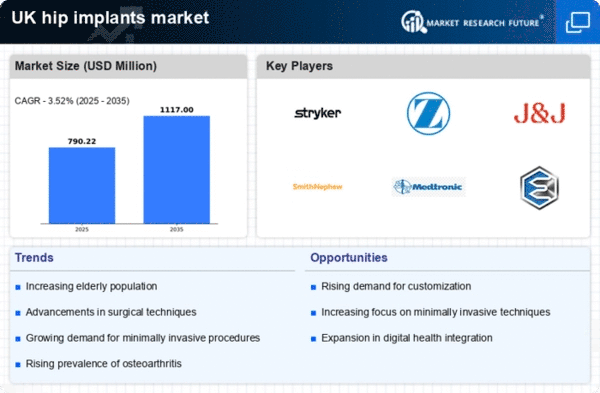Aging Population Impact
The aging population in the UK is a crucial driver for the hip implants market. As individuals age, the prevalence of hip-related ailments, such as osteoarthritis and fractures, tends to increase. According to recent statistics, approximately 20% of individuals over 65 experience significant hip issues, leading to a higher demand for hip implants. This demographic shift is expected to continue, with projections indicating that by 2030, the number of people aged 65 and older will rise to 23% of the total population. Consequently, the hip implants market is likely to expand as healthcare providers seek to address the needs of this growing segment, ensuring improved mobility and quality of life for older adults.
Rising Healthcare Expenditure
In the UK, rising healthcare expenditure is significantly influencing the hip implants market. The National Health Service (NHS) has been allocating increasing funds towards orthopedic procedures, including hip replacements. In 2025, the NHS budget for orthopedic surgeries is projected to reach £2 billion, reflecting a commitment to enhancing patient care. This financial support facilitates access to advanced hip implant technologies and surgical techniques, thereby driving market growth. Furthermore, as patients become more aware of treatment options, the demand for hip implants is likely to rise, prompting healthcare providers to invest in innovative solutions to meet patient expectations and improve surgical outcomes.
Increased Awareness and Education
Increased awareness and education regarding hip health are driving the hip implants market in the UK. Public health campaigns and educational initiatives have been instrumental in informing individuals about the risks associated with untreated hip conditions. As a result, more patients are seeking medical advice and exploring surgical options. Surveys indicate that nearly 40% of individuals aged 50 and above are now aware of hip replacement procedures and their benefits. This heightened awareness is expected to lead to a surge in consultations and elective surgeries, thereby propelling the growth of the hip implants market. Healthcare providers are likely to respond by enhancing their services to accommodate the growing patient interest.
Government Initiatives and Policies
Government initiatives and policies aimed at improving orthopedic care are playing a pivotal role in the hip implants market. The UK government has introduced various programs to enhance access to surgical procedures and reduce waiting times for hip replacements. For instance, the NHS Long Term Plan emphasizes the importance of timely interventions for hip-related conditions. As a result, funding for hip surgeries is expected to increase, facilitating better access to high-quality implants. This proactive approach is likely to stimulate demand within the hip implants market, as more patients are encouraged to pursue surgical options that can significantly improve their quality of life.
Technological Innovations in Implants
Technological innovations in implant design and materials are reshaping the hip implants market. Recent advancements, such as the development of highly durable materials and 3D printing techniques, have led to the creation of customized implants that better fit individual patient anatomies. These innovations not only enhance the longevity of implants but also reduce the risk of complications. In 2025, it is estimated that the market for advanced hip implant technologies will account for approximately 30% of total sales, indicating a shift towards more personalized and effective solutions. As these technologies continue to evolve, they are likely to attract more patients seeking improved surgical outcomes and faster recovery times.
















